#netta most
Explore tagged Tumblr posts
Text


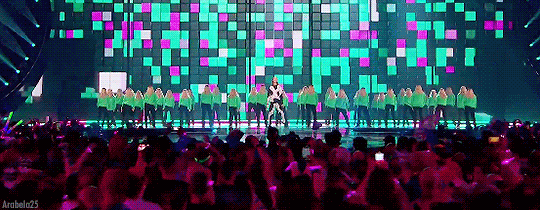
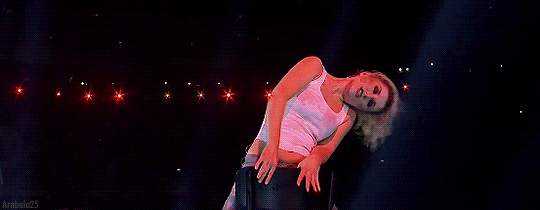

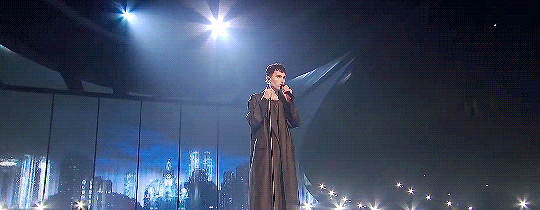

The Liverpool Songbook | Eurovision Song Contest 2023
#eurovision#eurovision 2023#esc#general thoughts: needed more ukraine#more specific thoughts for each performance:#mahmood: no. no no no. absolutely not. NO. NOOOOO#imagine was already overdone long before gal gadot killed it for good in 2020#netta: fun choice fun performance over the top costuming#dadi: fun!! very much in his style. he seems to be enjoying himself#and I'm also very happy for him for finaly FINALLY performing live to thousands in the arena and millions back at home#(he recently tweeted that they should get rid of prrecorded vocals)#(which I agree with but I'd love to ask him more about it)#(because his music relies a lot on voice effects and he did use a recorded choir in his own esc performance)#cornelia: not only she said ''I'm going to do the most'' she also added ''and I'm doing it for the sapphics'' nothing but respect for that#sonia: the hometown girl!! I always love to see an older act that maybe we wouldn't immediately think of#ofc she's from liverpool and it is the 30th anniversary of her participation so it makes perfect sense#I've always enjoyed her song too#duncan was very nice too especially when everyone joins him on stage and we see ruslana with the kids back in kyiv#what's next?? if sweden does something similar next year (various artists covering different songs) I don't want to see any of these people#I don't want to see them for the next 3 or 4 years at least#there are SO many artists that have participated the possibilities are endless we don't need to see the same people every time
55 notes
·
View notes
Text








So I was digging through my old art and here is early drawings of the gang... Not all of them tho
- AZ
#nate old art is forbidden brah i did not know how to draw him ill be so fr#JC has most of the Genesis art#i was bad at drawing them too 😭#miles didnt even exist here yet#azjlazule#oc#art#artwork#old art#SUMMER WAS SO PALE. SAVE ME#summer#felix#izzy#netta#charlotte#exo
2 notes
·
View notes
Text
eurovision next week has me super giddy!!! yes yes yes!!! best time of the year~!!!!
0 notes
Text
The Chilling Testimony of a U.S. Neurosurgeon Who Went to Gaza to Save Lives
Haaretz: Netta Ahituv May 9, 2024
When everyone who was able to flee from Gaza was doing so, Dr. David Hasan made the reverse journey. His story is a must-read for every Israeli
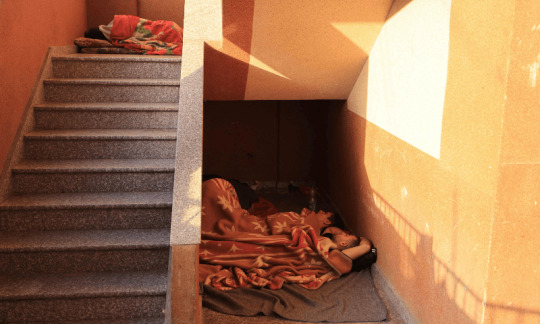
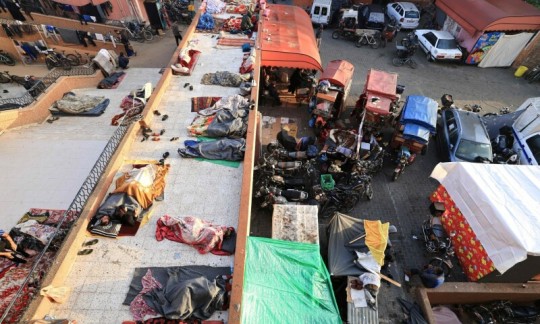
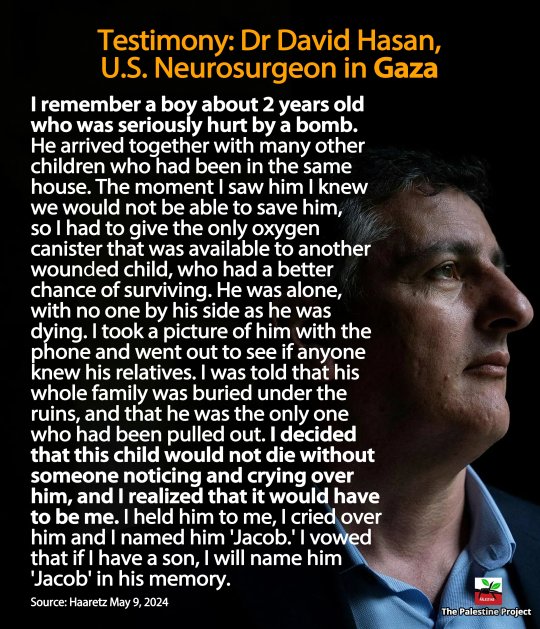
At the end of December 2023, when everyone who was able to flee from the Gaza Strip was doing so, Prof. David Hasan made the reverse journey. Hasan, a senior neurosurgeon and an esteemed researcher at Duke University in North Carolina, decided to fly to Cairo and from there to make his way to Rafah and enter Gaza.
"Until the war broke out, I was focused on advancing my career and taking care of my family," Hasan, who is 50, tells Haaretz in a video interview. "But this situation – which touched me from both sides [of the border] – overwhelmed me emotionally and pulled me in. I felt I had to do something to help."
Hasan was a member of the first medical team – consisting of 18 physicians from the United States, Canada and England – to enter the Strip after the start of the war. They arrived through Rahma Worldwide (an American humanitarian organization) and the organization Medical Aid for Palestine, under the auspices of the United Nations and the World Health Organization.
"The UN and WHO facilitated our entry and assisted with regard to the medications and surgical equipment we brought with us," Hasan says. "But they also informed us in advance that once we entered Gaza, they would have no way of providing us with protection." The doctors were asked to sign a document waiving the UN of any responsibility for their welfare, which, he says, "made the situation all the more threatening."
Their mission was to get to the European Gaza Hospital, near Khan Yunis in the southern Strip, and spend a week there performing surgery on adults and children. Then, less than two months ago, Hasan entered Gaza again on a similar mission, and saw firsthand the transformation that had taken place there since his previous visit.
"The first thing you see in Rafah," he relates, "is miles and miles of hanging fabrics – the tents of the displaced people, which are erected against the background of the ruins of buildings. When you turn onto Saladin Road, which is the main road connecting Gaza's north and south, suddenly you see an ocean of people. These are the displaced people who live there now. As you get closer to the hospital, you see more and more people, and more and more tents."
The hospital itself looked like a refugee camp, Hasan says. "I was confused, because I had never seen so many people living inside a hospital. Every corner there was occupied by a group of people. They made use of every available item – a small curtain, a staircase, a plastic chair – and turned it into their living space. Entire families huddled on squares of two meters by two meters, and ate, drank and slept there. Walking in the hospital, you had to be careful not to step on people."
On the day he entered the Gaza Strip in December, Hasan notes, he didn't see Israeli troops or hear explosions. "I thought the war was in some kind of lull. But as soon as evening fell, heavy shelling started, and I realized that there were many Israeli forces around the hospital – you just don't see them during the day. The noise of a one-ton bomb is deafening. The first time one was dropped nearby, I happened to be standing on a stool, and I fell off, because the building shook so hard. It went on like that every five or 10 minutes. I asked the local doctors what to do, and they told me that you get used to it and that I should just keep working to distract myself from the anxiety."
Where did you sleep? What did you eat?
"I slept in the hospital, ate mostly energy bars that my wife and daughter had packed for me, and drank mineral water. The water situation there worries me the most, and since returning for the first time, I have talked about water sanitation everywhere and with everyone I can. We lost many patients due to water-related infections."
Immediately upon arriving at the hospital, the physicians began operating. "In the process, we discovered that there weren't enough anesthetics, not enough equipment and not even clean water to wash our hands between operations. Sometimes there were no gloves and sometimes we lacked basic medicines. We were compelled to perform limb amputations without anesthetics and C-sections without sedatives. In order to do as much as we could, we would operate on two patients at the same time in the same operating room."
Throughout his first week there, Hasan relates, there was constant, heavy shelling. "During the night, it was not possible to rescue anyone from the ruins, both because there was no electricity and everything was dark, and also because just being outside was dangerous. So people who were wounded during the night remained where they were until morning. Many of them died from loss of blood or reached us in worse condition because they did not receive immediate treatment. Every morning around 8, a wave of wounded people arrived who had been rescued from the ruins of the night. At that point, around nine out of 10 of them could not be saved.
"The hospital has only 250 beds, so at any given moment, you have to make difficult decisions, as there were about 1,200 wounded. He can be saved, she can't, this wound requires resources that we don't have, we may be able to treat this wound. The feeling is that it would have been possible to save many of the wounded if we had more medical equipment, intensive-care beds and the possibility of hospitalizing them for further treatment."
Are there any of the wounded whom you remember in particular?
"From a medical point of view, I remember a boy of maybe 12 or 13 years old, who arrived with bleeding from his eye, from being hit by shrapnel. It was clear that he needed surgery, but there was a two-hour line for the operating room. During the wait, a main artery burst inside his brain and blood began spurting from his eye. I'd never seen anything like that before. He died, of course.
"From a humanitarian point of view, I remember a boy about 2 years old who was seriously hurt by a bomb. He arrived together with many other children who had been in the same house. The moment I saw him I knew we would not be able to save him, so I had to give the only oxygen canister that was available to another wounded child, who had a better chance of surviving. He was alone, with no one by his side as he was dying. I took a picture of him with the phone and went out to see if anyone knew his relatives. I was told that his whole family was buried under the ruins, and that he was the only one who had been pulled out. I decided that this child would not die without someone noticing and crying over him, and I realized that it would have to be me. I held him to me, I cried over him and I named him 'Jacob.' I vowed that if I have a son, I will name him 'Jacob' in his memory.
"Another case I remember is of three siblings – a 10-year-old boy, a 6-year-old girl and a baby boy of one and a half. According to what I was told, they had been in a house that was surrounded by Hamas activity. Israeli soldiers entered the house at night. In the dark, they thought the father was a Hamas operative and they killed him. The mother ran toward the father and she was killed too. The two parents lay there dead, but outside there was bombing taking place. The three children lay down on their parents until the sun came up. Not until morning did people come to take them out of the house. Someone brought them to the hospital.
"I remember that the eldest son held the little one and calmed him because he was crying, and at the same time took care of his sister, who didn't stop shaking like a leaf in a storm. They were covered with their parents' blood. We cleaned them and I brought them some toys and small dolls that my daughter had asked me to give to the children in Gaza. When I gave them the toys, I saw a small smile and they said to me, 'Thank you, Uncle David.' You could see that they were educated and polite children. I was relieved to learn that at some point a relative came and took them. I will never forget them – the thought of the shocking night they went through and the way the 10-year-old, the senior among them, suddenly became a parental figure."
David Hasan was born and raised in Kuwait to a Muslim Palestinian family, who had immigrated there from the West Bank in 1967, following the Six-Day War. It would not be the family's last war-induced emigration. The second time was in the Gulf War, in 1990, when they relocated from Kuwait to Jordan. Hasan, who had always dreamed of becoming a doctor, was accepted to premed studies in the United States and moved there alone at the age of 18.
Where did your unusual combination of names come from – a Jewish first name and an Arab surname?
"When I moved to the United States, I connected mainly with Jews and Israelis, and they helped me acclimate. They accompanied me through various crises, and I decided to change my name from Emad to David. I also had two Jewish girlfriends, one of whom I accompanied on a visit to Israel. By then, I already had an American passport, but in Israel they wouldn't let me enter and wanted to deport me on the next flight to the United States.
"This was a traumatic experience for my girlfriend, so I insisted on talking to the security manager and told him that instead of kicking me out, they should give me a prize. 'A prize? Why should I give you a prize?' he asked. I replied that thanks to me, my girlfriend had come here for the first time in her life. Jewish donors and the State of Israel pay so much money for Jews from all over the world to visit Israel, and here I was, at my expense, inviting a Jewish woman who would never have visited here if I hadn't insisted on it. He went off, muttering, 'It's only in fucking America that Palestinians go out with Jews.' After a while, I was informed that I could enter Israel. Other than that episode, I remember the visit fondly."
Hasan is married to Lauren Hasan, who worked as a trauma surgeon, and they have a 7-year-old daughter. They live near Duke, a private university in Durham, North Carolina. Hasan does clinical work, research and teaching and is considered a leading expert in the field of cerebrovascular disorders and brain-tumor surgery. He has published more than 270 scientific articles in major journals.
Hasan does not hesitate to attest to his love for Israel and Israelis, and talks about close friends in the country. He also has close ties with the Israeli NGO Physicians for Human Rights and with the Arava Institute for Environmental Studies, with both of which, together with UNICEF (the United Nations Children's Emergency Fund), he is trying to promote emergency water purification projects in Gaza. They have already received approval from Israel's Coordinator of Government Activities in the Territories and a promise of funding from USAID.
Asked how he reconciles the Israeli-Palestinian dissonance in his life, he replies simply, "I distance myself from groups that label the Israelis as only one thing and the Palestinians as another. I focus only on moral actions and on ways in which I can help practically."
American universities, including Duke, have become an arena of protests over the war. How do you deal with this?
"We launched an initiative at the university that offers all students the opportunity to be active in assisting victims of the war in all kinds of ways, as they wish, on whichever side they choose. We thought this would allow people to channel their anger into action instead of protesting and arguing among themselves. So far, it seems to be working well. I have already brought in Duke students – Palestinians and Jews – to be part of the water project and work together as a team. I tell my medical students that just as doctors are expected to be blind to their patients' origin, skin color, religion or gender, their attitude toward victims of war should be the same – I suggest to them to think about human beings and not about 'sides.'"
Hasan practices in his life what he preaches to his students. He went to help the Gazans, but the Israeli hostages in the hands of Hamas haunt his thoughts, and he brings up the subject frequently during his interview with Haaretz. On his first visit to Gaza, Hasan hoped he would be able to pressure the appropriate people to talk to members of the Hamas leadership to allow him to visit captives in order to assist them medically. He was warned that even raising the subject would endanger him and the entire delegation, but he insisted. In any event, it didn't happen, of course. No one knows if the request even reached any Hamas officials. Again, in his second visit to Gaza, in March, he put out feelers about the possibility of offering the captives medical aid. Once more, to no avail.
"I walked around the hospital and looked, searched and asked everyone I could if they had seen, heard or knew anything about them [the Israeli hostages]. I also looked for people with weapons, who might be guarding some room, but I didn't see anything like that either. As someone who saw what Gaza looks like aboveground, I can only imagine how terrible the conditions are for the hostages. I assume they don't get enough food, access to a shower or medical services. I also read the testimonies about sexual assault. God knows what condition they are in. I feel pain for them and their families and wish for their release as quickly as possible."
On the last day of the first trip to Gaza, Hasan began sweating and developed a fever. Once he left the Strip, he found out that he was infected with COVID-19, although he had of course been vaccinated. On the second trip, too, he returned home with a mysterious virus. "The situation in Gaza is the perfect storm for viruses – a combination of wounds that become infected because they cannot be cleaned properly, hospitals without proper sanitation and an absence of antibiotics. Add to that water unfit for drinking and a generally appalling sanitary situation. Almost every person we operated on died a few days later, due to infection. It suddenly came to me that surgery was like a death sentence for them. At one point I asked myself what I was doing there if I couldn't save people."
And what was your conclusion?
"That I should continue to do my best. Even if I saved one person, it is still worth the effort. From Judaism I learned that whoever saves one soul, it is as though he saved an entire world. I wanted to be a part of the hope in this conflict and make a difference, even if a small one, for the people who were hurt in it and are considered 'collateral damage.'"
What did you feel when you left the first time?
"Leaving is a bittersweet moment. On the one hand, it's a relief, and on the other hand, I was heartbroken and felt guilty for leaving these people, who need me. I have the option to leave, they don't. From being faceless numbers that I read about in the news, they became for me human beings with names, stories, aspirations and dreams. My consolation is that at least they saw that there were people who cared about them, people who had come a long way and were risking themselves for them, and maybe that would give them hope. I told them that although my body was leaving Gaza, my heart was staying there with them."
In mid-March, some two and a half months after the first visit, Hasan arrived in the Gaza Strip again. This time it was through Medtronic, one of the world's largest producers of medical devices, which was shipping equipment into Gaza. "On Friday I performed a complex operation at Duke Hospital, and within hours I was on my way to Cairo, with half a million dollars worth of medical equipment," Hasan relates. "In Egypt, I was able to get another ton of diapers and baby food, and then went on to Rafah."
There was a palpable difference between the two visits, Hasan relates. To begin with, the second time, there were fewer bombs falling, and they were smaller. On the other hand, however, he encountered more hunger and a higher density of displaced people. "I saw people who had clearly lost a great deal of weight and many more cases of infectious diseases. Mothers arrived with no milk to feed their babies, they were so weak. I remember one woman in her late 20s, an engineer by profession, who told me, 'Dr. David, my baby is crying and I can't do anything. You know Israeli women, right? Maybe you can appeal to them, in the name of the solidarity of women and mothers, to get them to request that at least we can have food for our babies sent to us? Tell them that here too there are mothers with feelings and aspirations for their children.'"
On the second visit, there were fewer medical staff evident, Hasan recalls, and those who were there showed signs of extreme burnout. "They don't earn money, their children are dying at home, and in addition, every trip to the hospital and back entails risking their life or getting bad news from home. Two doctors who worked alongside me returned home after a 24-hour shift and found that their families were buried under the ruins of the house they were in. Many of them felt that they had done their part and now had to worry about the survival of their own families. Those who remained were so exhausted that they developed indifference. A wounded person would arrive, and they would say it was preferable for the person to die, because we didn't have the means for taking care of him. I will not forget taking care of a 5-year-old boy with burns all over his body, who himself told me, 'I wish I was dead. ' At some point I also started to think that it would be better like that, because to be born a weak baby in Gaza means suffering a death sentence in agony."
In addition, Hasan relates, "There was a feeling of chaos, that things were much less organized than last time, that there was no authority or hierarchy. Everyone is worried about their own survival, hunger has an effect, and all kinds of groups were taking advantage of this situation in an awful way. Patients now began arriving who had been shot by [other] Palestinians in fights over food. Imagine hungry people who haven't eaten in days and have children to feed. They will do anything to get food."
The chaos Hasan describes almost cost him his life. On the way from Cairo to Rafah, the Egyptian driver asked him to deliver a bag of sweets to a Palestinian family he knew in Gaza for the Ramadan holiday. Hasan agreed and asked the driver to tell the family to look for him at the hospital. But when he arrived to collect the medical equipment at the border crossing, he discovered that it was not one bag but three huge sacks of sweets. It was certainly not a gift for a family.
He went up to one of the guards at the border, explained the situation and asked him for his advice. The guard explained to him that Egyptian and Gazan merchants were trying to take advantage of the situation to sell things at high prices – the goods he had might fetch thousands of dollars on the black market. He suggested that Hasan leave the sweets there and promised that he and his colleagues would distribute them for free to children for the holiday.
"On the way to the hospital, my phone kept ringing," Hasan recalls. "It turns out that these were the people to whom I was supposed to deliver the sweets. That night, at the hospital, about 10 people with guns suddenly appeared and demanded the candy. They said they were members of Hamas, but later it turned out that they weren't, they just wanted to scare me. It was actually a family that had seized control of a share of the black market. They told me that they knew my name was David and that I was actually an Israeli."
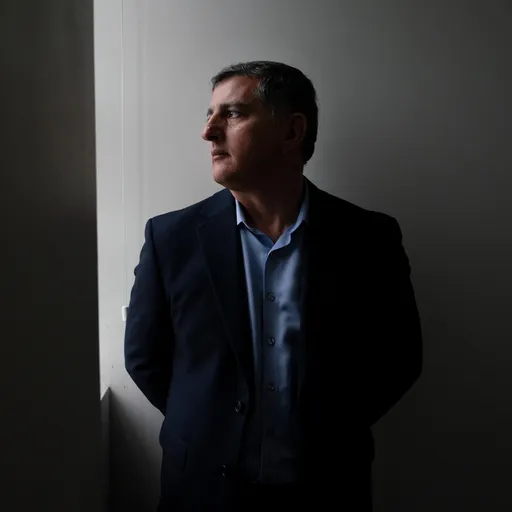
Hasan. "I walked around the hospital and looked, searched and asked everyone if they had seen, heard or knew anything about the Israeli hostages." Allison Joyce/AFP
The Chilling Testimony of a U.S. Neurosurgeon Who Went to Gaza to Save Lives Haaretz Netta... | Middle East (similarworlds.com)
Detroit doctor has never seen anything worse than crisis he witnessed in Gaza
Detroit doctor has never seen anything worse than crisis he saw in Gaza (freep.com)
Facebook
youtube
#genocide#gaza#palestine#free palestine#news#medical#humanitarian#humanity#human rights#war crimes#crimes against humanity#euronews#isreal#Dr. David Hasan#neurosurgery#Youtube#bafta awards#aurora borealis#jacob anderson#mothers day#unique gifts#david tennant#baftas#bafta 2024#eurovision#c4news#bethlehem#ethnic cleansing#doctor who#formula 1
28 notes
·
View notes
Text
Daily update post:
The biggest news is that an Israeli kidnapped by Hamas, Ori Magidish, has been rescued by the IDF the night before last during the Israeli raid into Gaza. Here she is with her parents:

Hamas' release yesterday of a vid with 3 hostages, which was meant as a part of the psychological warfare against Israel, was done after they knew she was liberated, but the public didn't yet. Hamas is now trying to muddy the water, and claim the vid was released first.
After the rescue of Ori and release of 4 other hostages, there are now 240 people confirmed as being held hostage in Gaza.
Rockets continue to be fired at Israel by Hamas in the south and Hezbollah in the north. In addition, an attack drone launched from Yemen at the southern city of Eilat was shot down by the IDF today. Eilat's population has been doubled as it absorbed many of the evacuated Israelis whose communities were massacred by Hamas. Altogether, Israel continues to fight on 5 fronts (Hamas, Hezbollah, Yemen, Syria in the north east, and independent terrorist attacks).
This speech from Dr. Michal Bitton is AMAZING:
youtube
This is Naftali Furst in a more recent picture (he's 91 years old):

This is Naftali when he was liberated from Buchenwald in 1945 by American soldiers (Elie Wiesel is also in this picture with him):
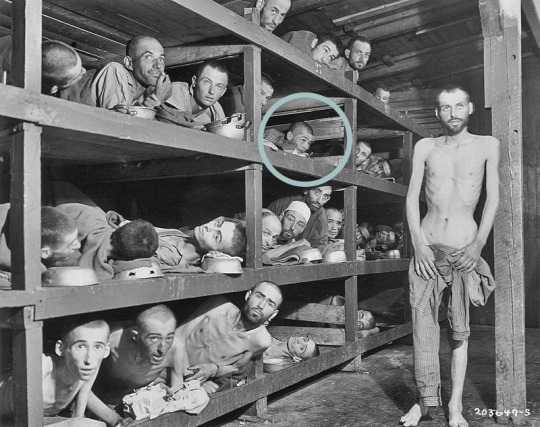
This is Naftali before WWII, with his older brother at the front:

Naftali's granddaughter Mika, her husband and their 2.5 year old son Netta live in kibbutz Kfar Azza, one of the communities where Hamas' massacre was most brutal. All three hid in a bomb shelter for 20 hours as their friends and neighbors were murdered in the houses next to theirs. Miraculously, the IDF got to them before Hamas' terrorists did. Netta's other grandparents were slaughtered in the kibbutz. Here's Naftali with Netta:

When asked about it, Naftali said that we mustn't forget that the Holocaust lasted years, not a single day, but Hamas are as brutal, used the same methods and are motivated by the same hate as the Nazis were. They too have the intention of destroying the Jewish people, he added. "It's not the Holocaust, but it's a mini Holocaust."
(for all of my updates and ask replies regarding Israel, click here)
#israel#israeli#israel news#israel under attack#israel under fire#israelunderattack#terrorism#anti terrorism#antisemitism#hamas#antisemitic#antisemites#jews#jew#judaism#jumblr#frumblr#jewish#Youtube
55 notes
·
View notes
Text
netta perseus has the most beautiful picking pattern… i just have to practice it verrrry slowly so i can play it cleanly
12 notes
·
View notes
Text
WHAT ARE QUANTUM GRAVITY THEORIES??
Blog#300
Saturday, May 27th, 2023
Welcome back,
As far as we know, our physical world is governed by four fundamental forces: electromagnetism, weak and strong nuclear forces, and gravity. Apart from playing with bar magnets or marveling at the light of a rainbow, it’s gravity that we’re most familiar with here on Earth. Yet, it’s actually the least understood force of the bunch.

Our understanding of gravity has undergone a number of face lifts in the past several hundred years—from Newton’s take on the movements of planets and apples to Einstein’s theory of general relativity and spacetime. However, for physicists like Kathryn Zurek, a theoretical physics professor at Caltech whose work focuses on dark matter as well as observational signals of quantum gravity, that still isn’t good enough.

She’s not the only one. Theorists and experimentalists around the world have toiled for decades to compose a so-called “theory of everything” that would unite quantum explanations of the very small with the classical physics of the very large (such as humans and planets). A verifiable theory of quantum gravity is at the center of this quest to offer a single theory that explains everything in our universe.

Scientists are fairly confident that a quantum explanation of gravity should exist, but finding a theory to support this belief—let alone proof that it’s correct—has been much more difficult, Zurek says.
In the standard model of particle physics, a model that explains all fundamental forces except gravity, forces are carried by specialized particles. For example, the electromagnetic force is ferried by photons, which can be experienced as light. Following this logic, physicists have proposed that gravity should have its own particle as well, which physicists have dubbed the “graviton.”

However, trying to incorporate a graviton into the picture with existing math has led scientists into a tangle of impossible math, such as equations ending in infinities.
Physicists are mulling over a number of theories to solve this problem, but Zurek says that string theory remains the best description to date.
Physicists originally proposed string theory in the late 1960s, and it can come in many different flavors. The general idea is that that the universe is made up of ten (or sometimes more) dimensions—only four of which make up space and time as we know it. The remaining dimensions are a type of unseen scaffolding.

In this multi-dimensional model, very small objects, called “strings, replace particles.” These strings resonate like plucked guitar strings at different frequencies, in accordance with different fundamental particles. Scientists theorize that one such frequency should map to the theoretical graviton.
One of the more mind-boggling conclusions we can draw from string theory is that gravity might not strictly even be “real.”

That is, gravity—and even spacetime—may just be emergent properties created by the quantum entanglement of particles. Netta Engelhardt, a theoretical physicist at the Massachusetts Institute of Technology, this phenomenon is similar to the feeling of heat actually being just our bodies’ experience of the speed of air molecules around us.
Originally published on www.popularmechanics.com
COMING UP!!
(Wednesday, May 31st, 2023)
"IS THE UNIVERSE A QUANTUM FLUCTUATION??"
#astronomy#outer space#alternate universe#astrophysics#spacecraft#universe#white universe#space#parallel universe#astrophotography
125 notes
·
View notes
Text
BATTLE BEAST And SMACKBOUND Singers Return With Second Collaborative Album, 'Falling Through Stars'

LAURENNE/LOUHIMO — the collaboration between powerhouse Finnish vocalists Noora Louhimo (BATTLE BEAST) and Netta Laurenne (SMACKBOUND) — will release its sophomore album, "Falling Through Stars", on April 18, 2025 via Frontiers Music Srl. The official music video for the LP's first single, "Damned", can be seen below.
On the single, Laurenne comments: "'Damned' is our first single release, and it represents the most classic style of melodic metal and hard rock on the album. Full of energy and attitude, we wanted to create a video that shows us performing alongside the musicians who played on the album. The song explores the struggles of battling inner demons, depression and self-doubt — while also capturing the determination to rise above them."
LAURENNE/LOUHIMO is one of the most exciting projects on Frontiers Music Srl and, in this second chapter, deliver a full force metal assaults with the power to blow you away.
LAURENNE/LOUHIMO offers listeners a mix of heavy metal and hard rock tracks that explores the variety of the genre, while maintaining a straightforward, easy-to-enjoy appeal.
"Falling Through Stars" has shades of all eras of RAINBOW here and there, as well as JUDAS PRIEST and many other 1980s icons of the style. All of these influences are expertly filtered into Netta and Noora's way of composing music.
The idea of a possible collaboration between Netta and Noora became a reality once the pandemic started and cleared out calendars for both artists. It felt like a perfect time to start the project and share all the things they have in common, from the same original town to similar idols and influences.
The main highlights of the album are, naturally, the vocal melodies created and shared by Netta Laurenne and Noora Louhimo.
"Falling Through Stars" has been once again produced at the Sonic Pump studio under the guidance of Nino Laurenne (who also played the guitars and contributed to the songwriting). The production is clear and powerful and gives the deserved value to the two stars here.
Songs like "Falling Through Stars", "Damned", "Loud And Clear" and "Wait" are just a few of the highlights of a great album that will please all melodic metal fans.
Commenting on the album, Laurenne states: "'Falling Through Stars' is the second collaborative album with Noora, and it gave us the opportunity to step in and out of our comfort zones to meet halfway. We had a great time writing and recording the album, which I co-produced with my husband, Nino Laurenne. This album takes us on a journey through both the past and future of metal. We've aimed to incorporate styles, instruments, and emotions spanning from the '70s to the present day. It's a dynamic album that showcases both raw power and delicate moments, and we're excited to share it with everyone"
"Falling Through Stars" track listing:
01. Falling Through Stars 02. Damned 03. To The Dark 04. All For Sale 05. The Cradle 06. Rotten Gold 07. FTS 08. Let The Light Be Free 09. Loud And Clear 10. Wait 11. David Bowie & Clyde
LAURENNE/LOUHIMO recording lineup:
Netta Laurenne - Lead & Backing Vocals Noora Louhimo - Lead & Backing Vocals Sampo Haapaniemi - Drums Pasi Heikkilä - Bass Vili Itäpelto - Keyboards & Programming Mikko Kosonen - Solo/Acoustic/Lead & Additional Guitars Nino Laurenne - Rhythm & Solo Guitars
youtube
3 notes
·
View notes
Text
Tagayanetta palaeobaikalensis Zelenkov, 2023 (new genus and species)

(Type coracoid [shoulder bone] of Tagayanetta palaeobaikalensis, from Zelenkov, 2023)
Meaning of name: Tagayanetta = Tagay Bay Netta [genus of ducks including the red-crested pochard]; palaeobaikalensis = from ancient [in Greek] Lake Baikal
Age: Miocene (Burdigalian), about 16.3–16.5 million years ago
Where found: Tagay Formation, Irkutsk Oblast, Russia
How much is known: Multiple partial forelimb bones, a tarsometatarsus (fused ankle and foot bones), and the tip of an upper bill. It is unknown whether any of these bones belonged to the same individuals.
Notes: Tagayanetta was a small duck, about the same size as the extant Eurasian teal (Anas crecca). It does not appear to have been specialized for diving and may have been closely related to modern Anatini, the group of ducks containing most dabbling species such as the mallard (Anas platyrhynchos) and its domesticated forms. In particular, its narrow tarsometatarsus resembles that of the extant crested duck (Lophonetta specularioides) of South America.
Reference: Zelenkov, N.V. 2023. Small ducks (Aves: Anatidae) from the early–middle Miocene of Eurasia. Part 2. The fauna of Tagay locality (Baikal Region; Eastern Siberia). Paleontological Journal 57: 560–572. doi: 10.1134/S003103012305012X
45 notes
·
View notes
Note
Search Britannica
Search Britannica...
Ask the ChatbotGames & QuizzesHistory & SocietyScience & TechBiographiesAnimals & NatureGeography & TravelArts & CultureProConMoneyVideos
Science
Birds, Reptiles & Other Vertebrates
Birds
Common, or northern, pintail (Anas acuta).
duck
bird
Written and fact-checked by
Last Updated: Dec 11, 2024 • Article History
Related Topics: dabbling duck whistling duck perching duck diving duck Anatinae
On the Web: University of Wisconsin-Madison - Livestock Division of Extension - The Origin of Ducks (Dec. 11, 2024)
News • Rangers trade captain Jacob Trouba to Ducks, shed full $8 million salary • Dec. 6, 2024, 9:11 PM ET (USA Today)
duck, any of various species of relatively small, short-necked, large-billed waterfowl. In true ducks—i.e., those classified in the subfamily Anatinae in the waterfowl family Anatidae—the legs are placed rearward, as in swans, rather than forward, as in geese. The result is a distinctive waddling gait. Most true ducks, including a few inaccurately called geese (e.g., sheldgeese) by reason of size and build, also differ from swans and true geese in the following characteristics: males (drakes) and females (hens or ducks) exhibit some degree of differentiation in plumage and in call, males molt twice annually, females lay large clutches of smooth-shelled rather than rough-shelled eggs, and both sexes have overlapping scales on the skin of the leg. The wild mallard (Anas platyrhynchos) is believed to be the ancestor of all domestic ducks, and it has undergone numerous crossbreedings and mutations since it was first domesticated in China between 2,000 and 3,000 years ago.
1 of 4
Mandarin duck (Aix galericulata), an Asian perching duck.
2 of 4
mallardMallard (Anas platyrhynchos).
3 of 4
wigeonEuropean wigeon (Anas, or Marcea, penelope).
4 of 4
northern shoveler (Anas clypeata)A male northern shoveler (Anas clypeata) in flight.
All true ducks, except those in the shelduck group (the tribe Tadornini) and sea ducks (the tribes Mergini and Somateriini), mature in the first year and pair only for the season—unlike the late-maturing, life-mating true geese and swans. Ducks are generally divided into three major groups, dabbling (shallow-water), diving, and perching ducks, based on their characteristic behaviours. The mallard, a typical dabbling duck (any of about 38 species of Anas and about 5 species in other genera), is one of the most popular game birds.
northern pintail (Anas acuta)A northern pintail (Anas acuta) standing near the edge of a pond.
Pintails, teals, shovelers, and wigeons are also dabbling ducks classified in Anas, in addition to the gadwall (A. strepera) and the black ducks (A. sparsa, A. rubripes, and A. superciliosa). Perching ducks such as the muscovy (Cairina moschata), the wood duck (Aix sponsa), and the mandarin duck (Aix galericulata) have long claws and are the most arboreal of ducks, often roosting in trees. The diving ducks (or sea ducks) include the greatest number of marine species, such as eiders (which are variously classified as members of the tribe Mergini or placed in a separate tribe Somateriini) and scoters (Melanitta), but they also include primarily freshwater species such as mergansers (Mergus and Lophodytes), the ring-necked duck (Aythya collaris), and the pochards (Aythya and Netta), including the scaups (A. marila, A. affinis, and A. novaeseelandiae) and the canvasback (A. valisineria). The redhead (A. americana), the goldeneye (Bucephala clangula and B. islandica), and the bufflehead (B. albeola) are diving ducks that live in fresh and salt water, depending on the season. Members of the stifftail group, typified by the blue-billed ruddy duck (Oxyura jamaicensis), are highly aquatic diving ducks characterized by legs set far toward the rear of the body. The whistling ducks (Dendrocygna), also called tree ducks, are not true ducks but are more closely related to geese and swans. Ducks that are not included in those larger groups are the freckled duck (Stictonetta naevosa) and the torrent duck (Merganetta armata), as well as the shelducks (Tadorna) and the steamer ducks (Tachyeres). All ducks, geese, and swans belong to the family Anatidae. For a more detailed classification, see anseriform.
Britannica Quiz
Deadliest Animals Quiz
Duck raising is practiced on a limited scale in most countries, usually as a small-farm enterprise, although large flocks are bred in some areas of England, the Netherlands, and the United States. The American Poultry Association lists 17 domesticated breeds, divided into four classes: heavy, medium, lightweight, and bantam. The White Pekin, originally from China, is the most widely raised duck in the United States, because it is meaty, fast growing, and prodigious in egg production. Duck feathers are also of some value, though they have been largely replaced by synthetics. Eiderdown, the down feathers of the common eider (Somateria mollissima), are still of wide commercial value for use in luxury quilts and pillows.
The Editors of Encyclopaedia Britannica
This article was most recently revised and updated by John P. Rafferty.
Science
Birds, Reptiles & Other Vertebrates
Birds
waterfowl
bird
Written and fact-checked by
Article History
Related Topics: duck swan goose Anser Anatinae
waterfowl, in the United States, all varieties of ducks, geese, and swans; the term is sometimes expanded to include some unrelated aquatic birds such as coots, grebes (see photograph), and loons. In Britain the term refers only to domesticated swans, geese, and ducks kept for ornamental purposes, wildfowl being the term used for wild birds of this group, especially in the context of shooting for sport. See also duck; goose; swan.
"...I don't know what's more surprising. The duck fact's or the fact that I read all of this...
#hazbin hotel#lucifer morningstar#lucifer hazbin hotel#hazbin lucifer#lucifer#hazbin hotel lucifer#luci#hazbin
6 notes
·
View notes
Text
Duckvember Day 22: Loved Duck
I was gonna try to draw Gene and Faris looking cute on a motorcycle but I have failed. I’ll try later maybe. Instead I picked a song from each of my shipping playlists. SOME CHARS I don’t have a full shipping playlist for them but I have shipping songs on their character playlist if that makes sense lol. TUMBLR will only let me post 10 links at a time so I will reblog this with more links and info. Next part coming in a second!
Duck Revenger x Alpha (Nega Donald and Nega Uno)
So I have a headcanon for Negaverse Donald and Alpha would still kinda be heroes. But of course, being the Negaverse, they have more edgy drama. Also Uncle Scrooge is evil and they have to deal with that.
youtube
Duke L’Orange x OC Gallery
Gallery belongs to @fluxchix
This is actually from a playlist I made for a story that took place wayyy in the future where Gallery is resurrected by magic and Duke’s been alive for a good thousand years (also because of magic.) LOOK it’s a long story. There was space travel and mysteries it was great okay.
youtube
AND THEN here’s a normal shipping song I always think of them with:
youtube
Faustina (OC for Ducktales/Darkwing)
GOD her shipping playlist just has so many good songs in it to pick one is hard. It’s not having her shipped with anyone in particular just how she does relationships lolol. Lot of the songs make her sound worse than she really is I swear. >_> Two for her
youtube
Also this song this has gore:
youtube
Non Gore version:
youtube
Fethry x Poe (Ducktales 2017)
So I ship these two for my headcanons for 87/comic blend universe. Poe and Fethry in that universe don’t start being an item until Magica and Gladstone have been together for awhile. I don’t really have a playlist for that ship because there isn’t really any drama to it to have a playlist lololol. For 2017 I have Poe being an active villain so of course more dramaaa. This playlist has a lot of Raven based songs but the main one I picked to show is just a nice angst with a twist ha.
youtube
Gene x Djinn
Oh lawd I’ve been trying to fill their shipping play list for more happy songs because MOST of their story is happy. It’s just easy to find songs for when that ONE bad thing happens. (*cough* Merlock *cough.)
youtube
youtube
Grimstone (Nega Gladstone) x OC Sheldrake Netta
My headcanon for Nega Gladstone is up to stuff with @cataradical OC’s Sheldrake. But they are both bastards so their playlist is full of bastard love songs.
youtube
10 notes
·
View notes
Text

Genesis got dat tism and cannot stand the texture of most clothes or anything thats meant to be worn long term since theyyyyy kind of suck at taking care of themselves and being hygienic (HOW do you spell that.) basically making them a nudist. When they were living in Netta's household, her mom would try to ladify them and basically tried to indoctrinate (/nsrs) them into Womanhood. this was not a comfortable experience
- JC
#tism#azjlazule#oc#original character#fun stuff#also bras just suck#they dont need vaccines to be autistic
7 notes
·
View notes
Text
first mamhood then netta, thanks eurovision for putting 2 of the people i find most annoying one after the other
46 notes
·
View notes
Text
Not to mention Israel send the most low quality stupid ass boring dumb lyrics song in the fucking world like this song is dumber than netta and thats the only award it deserves
46 notes
·
View notes
Text
Happy Hippy Mixtape 2023
To commemorate the passing of 2023, I’ve put together my nineteenth annual collection of the songs that made me happiest, that moved me to dance, that made each day a little better than the one before.
Download/Stream
Note that the Spotify version is missing two songs, including this year's bonus track. For the complete streaming experience, try YouTube.
Listen to Happy Hippy 2023 on Spotify (28/30 tracks)
Listen to Happy Hippy 2023 on YouTube (30/30 tracks)
Download the entire Happy Hippy 2023 MP3 mix in ZIP format
Download the Happy Hippy 2023 mix as a single MP3 file

Track List:
Thank You / Daði Freyr
Heat and Hot Water (Passion Pit Remix) / ARMS
Counterpoint / Delphic
This Head I Hold / Electric Guest
Angel Face / Gena Rose Bruce
103 / The Kills
Break and Enter / Hyper and Blue Stahli
Hate or Glory / Gesaffelstein
The Big Bad Wolf / The Heavy
Don't Let The Devil / Killer Mike ft. El-P, Run The Jewels, thankugoodsir
Dead Man Walking (feat. Virus Syndicate) / Milanese
Sing Me To Sleep / KING 810
Number 9 ft. Lil Yachty / Miguel
nihilist blues / Bring Me The Horizon ft. Grimes
Scream / Jake Daniels
Toy (#NotYourToy Remix) / NETTA
Slate / Model/Actriz
Cadillac (A Pimp's Anthem) / Victoria Monét
bullseye / girl_irl
Little Girl Gone / CHINCHILLA
Do It So Good / WARGASM
Pink Whitney / Scene Queen
Cha Cha Cha / Käärijä
Revenge Of The Orchestra (ft. Magugu) / Apashe
Wicked Game / Tenacious D
A House in Nebraska / Ethel Cain
Harbour (Song For Elizabeth) / Beverly Glenn-Copeland
The Magic Place / Julianna Barwick
Everytime We Touch / Electric Callboy
This year's bonus track is funnier on video.
As always, special thanks goes to Fluxblog and CPI for continuing their dedication to the art of the MP3 blog. I found most of these tracks through them.
This year's companion dance music mixtape, Dancey Hippy 2023, is available here: https://www.tumblr.com/y00h00/737189138978242560/dancey-hippy-mixtape-2023?source=share
You can browse all my mixes on Tumblr here: http://y00h00.tumblr.com/tagged/mixtape
The complete Happy/Dancey Hippy mixtape archive going back to 2004 is available for download here: https://drive.google.com/drive/folders/1E2ZbJOv28bw1AYYjuu_FzcpIk8dPVgWj?usp=sharing
5 notes
·
View notes
Text
Eurovision Fact #465:

For each Eurovision Home Concert, performers got to sing a cover of a Eurovision Song they enjoyed.
There were a total of 55 cover performances, and a handful of songs were repeated by artists.
The most popular songs to cover were:
'Satellite' by Lena (Germany 2010)
'Euphoria' by Loreen (Sweden 2012)
'TOY' by Netta (Israel 2018)
'Arcade' by Duncan Laurence (Netherlands 2019)
'Répondez-moi' by Gjon's Tears (Switzerland 2020)
'Fairytale' by Alexander Rybak (Norway 2009)
'Rise Like a Phoenix' by Conchita Wurst (Austria 2014)
'Euphoria,' 'Satellite,' and 'Arcade' were all sung three times while the rest were sung twice, not counting Gjon's Tears' own performance of 'Répondez-moi.'
Additionally, 'Rise Like a Phoenix' was performed twice in the same Eurovision Home Concert! First by Dami Im (Australia 2016) next by MELOVIN (Ukraine 2018).
[Source]
Eurovision Home Concerts Playlist, YouTube.com.
#esc facts oc#eurovision#eurovision facts oc#eurovision song contest#esc#esc 2020#Eurovision home concerts#loreen#lena#duncan laurence#gjon's tears#netta#alexander rybak#conchita wurst
12 notes
·
View notes